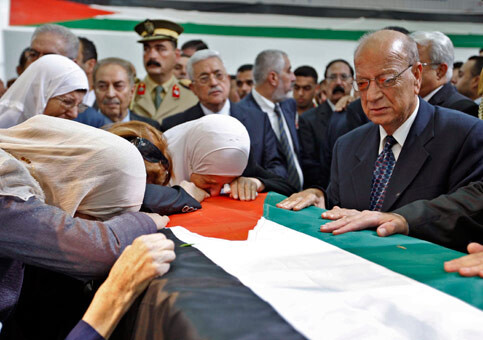The Electronic Intifada 19 August 2008

Relatives of the late Palestinian poet Mahmoud Darwish along with Palestinian Authority officials mourn over his coffin during his state funeral in the West Bank city of Ramallah, 13 August. (Mustafa Abu Dayeh/POOL/MaanImages)
Last Wednesday’s state funeral in Ramallah for the revered Palestinian poet Mahmoud Darwish revealed how far the Palestinian people are from realizing the justice imagined in Darwish’s writing, and was a sad reminder of how the Palestinian Authority (PA) helps undermine his people’s struggle.
On the day that Darwish’s body was laid to rest, amid tens of thousands of Palestinians mourning in the streets and many more in their homes, his criticisms of and hopes for the Palestinian and Israeli governments and societies remained unheeded and unrealized. However, Darwish’s official funeral at the PA headquarters, with all of its military pomp, demonstrated that the PA had its own interests in mind over that of respecting, never mind fulfilling, Darwish’s message and legacy.
Darwish joined the Palestine Liberation Organization in 1973 but broke 20 years later in disagreement with their signing with Israel the Oslo Accords which Darwish believed did not even minimally fulfill Palestinians’ rights. The Oslo Accords established the PA and initiated the “peace process” supposedly aimed at creating an independent Palestinian state, but were null and voided after Israel doubled its illegal settlement population in the years that followed, dashing any hopes of Palestinian sovereignty.
It is hard to imagine that Darwish would have been pleased with his PA-sponsored state funeral. Indeed, with the Oslo Accords he opposed came the establishment of the PA and the illusion of a Palestinian government in parity with Israel. However, in effect the PA served as an arm of the occupation, relieving Israel of its obligations as an occupying power. Meanwhile, Israel continues to colonize Palestinian land, control the borders and Palestinian movement, and the Palestinians are no closer to realizing their right to self-determination.
Furthermore, Darwish was overtly critical of political factionalism between Fatah and Hamas, Palestine’s leading governing parties. In July 2007, he described deadly infighting in Gaza as “a public attempt at suicide in the streets.” He said with irony, “We have triumphed. Gaza won its independence from the West Bank. One people now have two states, two prisons who don’t greet each other. We are victims dressed in executioners’ clothing.”
Palestinian Authority President Mahmoud Abbas eulogized at Darwish’s funeral: “You remain with us, Mahmoud, because you represent everything that unites us.” Abbas spoke of Palestinian unity but in actuality, the PA has complied with Israel and the US’s attempt to further fracture Palestinian society by isolating Gaza from the West Bank. Renewed infighting emerged this summer between Fatah and Hamas, with the more severe rights violations occurring at the hands of Hamas in Gaza. But for their part, the al-Aqsa Martyr Brigades, closely linked to Fatah, abducted a senior member of Hamas in the West Bank in Nablus earlier this month. Palestinian security forces also detained up to 50 Hamas members, including senior party figures, also in the West Bank earlier this month.
If the PA wanted to truly honor Darwish’s message, they should have first avoided the state procession at the Muqata’a, which serves as the PA headquarters and presidential compound, and has come to symbolize the powerlessness of the PA since its besiegement and partial destruction by Israel in 2002. In fact, six years later, one can still see piles of rubble within the walls of the compound, a testament to the impotence of the PA.
Instead, the ceremony and burial at the Cultural Palace which followed the state funeral should have been the main procession. Darwish was, after all, a poet of the people, giving voice to their suffering and dreams. And if there is a common current throughout his oeuvre, it is his challenging of injustice whatever its source or perpetrator.
In a 2002 interview, Darwish stated: “I thought poetry could change everything, could change history and could humanize, and I think that the illusion is very necessary to push poets to be involved and to believe. But now I think that poetry changes only the poet.”
Perhaps Darwish’s poems cannot singularly, or even with any great consequence, end the occupation of Palestine and establish an independent Palestinian state. But his legacy is nevertheless one of hope. Palestinians, and the world, can only hope that someday the poetic justice that his works champion will rise from the pages of books and materialize into something tangible for his people and greater humanity.
Sumia Ibrahim is an Iraqi-Palestinian American residing in Birzeit, Palestine this summer. A recent graduate of Rutgers University in New Jersey, an activist of several years against the US war on Iraq, and a media advocate against racial profiling since her profiling experience at JFK airport in New York City in fall 2006, Sumia is the recipient of the Rachel Corrie Scholarship from the Palestinian American Women’s Association to study at Birzeit University this summer.
Related Links




